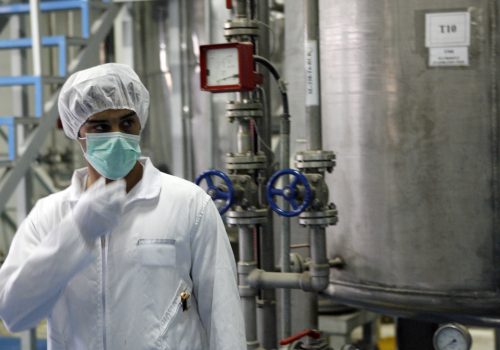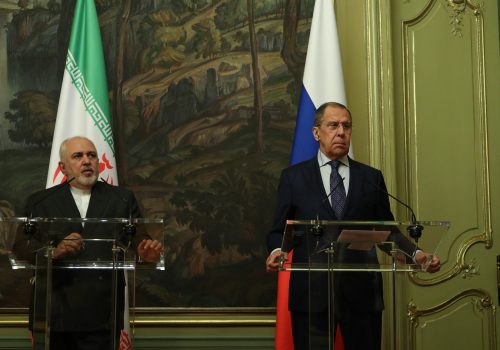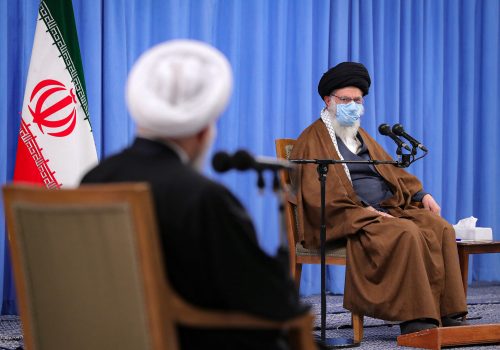With Iran, nuclear diplomacy comes first
Since Joe Biden’s inauguration on January 20, the new administration’s top foreign policy and national security figures have said repeatedly that the United States would resume full compliance with the 2015 Joint Comprehensive Plan of Action (JCPOA) if Iran does.
These US officials have added that “we need to work on an agreement that’s longer and stronger than the original one” and “to engage other issues that were not part of the original negotiation,” including Iran’s “destabilizing actions” in the region and its ballistic missile program.
Some in Washington foreign policy circles and elsewhere have been arguing for a new agreement that deals with nuclear, regional, and bilateral US-Iran issues all at once. However, this path is doomed to fail. If Iran wanted to renegotiate the JCPOA framework or add other topics to the agreement, it would have done so while the Donald Trump administration was in office and punishing Iran with maximum pressure sanctions.
The reality is that Iran is not ripe for a “grand bargain.”
The JCPOA was achieved because negotiators realized that the only way to reach a resolution was to isolate the nuclear issue. For example, in 2017 Anthony Blinken, now Biden’s Secretary of State and deputy secretary under the Obama administration, said, “In an ideal world, we would have negotiated every misbehavior that Iran conducts both at home and around the world. But we live in the real world, not an ideal world. The only issue that our partners were prepared to negotiate, including the Europeans, including China, Russia, not to mention Iran, was the nuclear program.”
Members of the Gulf Cooperation Council (GCC), who supported the JCPOA in 2015, also did not want regional issues to be included in the nuclear talks. Catherine Ashton, the former lead negotiator for the European Union and coordinator of the nuclear negotiations, argued that the regional countries “did not wish us to start engaging in broader questions that really affected them and not the people in the [negotiating] room.” Moreover, she stated that “the mandate by the United Nations Security Council (UNSC) was to resolve the nuclear dossier” and it was not possible to tackle other issues at the same time.
Those actors in the GCC and elsewhere that are now pushing for an expanded framework are actually attempting to jeopardize any chance to revive the JCPOA and improve US-Iran relations.
The Biden Administration, in collaboration with five permanent members of the UN Security Council plus Germany (P5+1), should compartmentalize issues with Iran. Any modification of the JCPOA should only be about the nuclear issue and in exchange for removing more sanctions. Regional issues and Iran-US bilateral concerns can be pursued in other forums in parallel with nuclear talks but depend on the US and Iran returning to full compliance with the JCPOA first.
Iran’s regional actions must be negotiated with regional actors. The US and other world powers should work with the United Nations Secretary-General to facilitate a dialogue among Iran, the six members of the GCC, and Iraq. However, some aspects related to US national security could also be negotiated bilaterally between Tehran and Washington.
Iranian public opinion supports a nuclear first approach. In a new poll by the University of Maryland and Iran Poll, 54 percent of Iranians said that the US should first return to the JCPOA and then Iran should wait a few years to see if the US stays compliant with the nuclear deal before negotiating on other issues.
Many in the new Biden foreign policy team were key figures in the Barack Obama administration’s nuclear talks with Iran and have been calling vehemently to preserve the JCPOA during the past four years. The fact that these individuals were so clear-eyed about the agreement’s value and the best ways of approaching Iran should incentivize them to make bold moves while remaining in the framework of “don’t trust and verify.”
In a New York Times op-ed with incoming CIA director William Burns in October 2019, Jake Sullivan, Biden’s national security advisor, wrote that “the Iranians have known since the secret talks that we saw this as an iterative process, like other arms control processes, in which one agreement became a foundation stone for further negotiations. The nuclear deal agreed to in 2015 was meant to be the beginning, not the end, of diplomacy with Iran.” This underlines the importance of reviving the JCPOA before delving into other matters.
Soon after the 2020 presidential elections, Robert Malley, now the US Special Envoy for Iran, concurred that “as soon as you start opening anything up…you complicate it and by definition then you’re in a longer negotiation and you run the risk of during that period of seeing things go sideways.” Moreover, Malley was a special guest at the UNSC meeting on the Persian Gulf last October where he presented his views in support of dialogue and cooperation in the region.
The European Union and European parties to the agreement are also not in favor of adding other topics to the JCPOA, though they are keen on discussing those issues in other fora. Josep Borrell, the EU’s High Representative for Foreign and Security Policy, said to the Atlantic Council on February 23, that “Maybe there are other issues that have to be taken into consideration, but don’t put everything together at the same time. Then you are going to block the process… if you start talking about pending issues in the beginning, you will never restart.”
If the US continues to delay its return to the agreement, it risks its destruction. Blinken told CBS News in 2019 that “at some point, those in Iran who are against the nuclear deal from the beginning will reassert themselves and say, ‘We are no longer abiding by our obligations.’” Blinken was referring to hardline factions that have a good chance of winning Iranian presidential elections in June.
The results of the upcoming Iranian presidential elections will also shape Iran’s relations with the West in general and Washington in particular. The transition of power in Iran and the US has often been desynchronized but, in August, both Iran and the US will have new governments for the first time since 1989. It is in the US interest to continue dealing with moderates and reformists. Those factions are sure to lose unless the JCPOA is revived and the promised benefits of the agreement are felt across Iran.
For their part, Iranian officials at all levels have shifted their talking points regarding the US. They have been clear that they are willing to reengage the US despite the bitter experience of the past four years. It is past time that the Biden foreign policy team implements what they have been preaching and reaches out to Iran in a constructive manner.
Mehran Haghirian is a PhD candidate at Qatar University and a researcher and assistant director at the Ibn Khaldon Center for Humanities and Social Sciences. Follow him on Twitter: @MehranHaghirian.
Subscribe for more from IranSource
Sign up for the IranSource newsletter, which provides a holistic look at Iran’s internal dynamics, global and regional policies, and posture through unique analysis of current events and long-term, strategic issues related to Iran.
Image: REFILE - CORRECTING SPELLING OF SURNAME Iran's top nuclear negotiator Abbas Araqchi and Secretary General of the European External Action Service (EEAS) Helga Schmid attend a meeting of the JCPOA Joint Commission in Vienna, Austria, June 28, 2019. REUTERS/Leonhard Foeger


